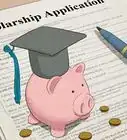This article was co-authored by Alexander Ruiz, M.Ed.. Alexander Ruiz is an Educational Consultant and the Educational Director of Link Educational Institute, a tutoring business based in Claremont, California that provides customizable educational plans, subject and test prep tutoring, and college application consulting. With over a decade and a half of experience in the education industry, Alexander coaches students to increase their self-awareness and emotional intelligence while achieving skills and the goal of achieving skills and higher education. He holds a BA in Psychology from Florida International University and an MA in Education from Georgia Southern University.
There are 7 references cited in this article, which can be found at the bottom of the page.
This article has been viewed 13,639 times.
Studying overseas can expose you to new experiences, allow you to become immersed in a different culture, and even help you become fluent in a foreign language. However, taking your education abroad can also be very expensive. College scholarships and scholarship programs dedicated to studying abroad are a great way to save money without taking on a lot of debt. By finding a program that’s right for you, writing a great application, and planning ahead, you may be able to get a scholarship to help you study abroad.
Steps
Finding a Scholarship
-
1Choose a few countries where you want to study. One of the biggest appeals of studying abroad is the ability to immerse yourself in a foreign culture while you learn. Consider which cultures you might want to experience and which countries you want to visit when choosing somewhere to study abroad.[1]
- Keep in mind any language barriers that might complicate your study. If you’re learning a foreign language, studying in a country that speaks in your chosen language might help you become fluent. However, studying in a country where you don’t know anything about the language will be incredibly difficult.
-
2Look online for scholarships for the country you want to study in. Most countries and universities will have online listings where you can find information about scholarships in different countries. Look online or visit your university website to find more information about your options to study abroad in your chosen country.[2]
- If you live in the United States, you can find information about all sorts of scholarships on the NAFSA website, located here: https://www.nafsa.org/
- Your university website will likely have a section dedicated to studying abroad or foreign exchange programs that you can look into. Some programs may even allow you to use scholarships or financial aid for your current school as partial or full payment.
- Find and apply for as many scholarships as you can! The more scholarships you apply for, the more likely you are to receive one.
Advertisement -
3Ask about program-specific or subject-specific scholarships at your school. The department at your school may have strong relationships with equivalent departments all around the world. If you want to continue studying your chosen subject or program, ask your course director or counselor about foreign exchanges and scholarship options that you could take advantage of.[3]
- Even if your school doesn’t have a scholarship to study in your desired country, they may have programs available in nearby countries or at very highly-recognized universities that you could look into.
- If your course director, teacher, or course counselor doesn’t know of any scholarships, they may still be able to help you get one that you find on your own.
-
4Find scholarships that fit with your background. There are a lot of scholarships designed to help out certain racial or ethnic minorities, those studying in certain fields, people who return to study at a certain age, or students with ties to the military. Think about your background and anything that might make you unique when looking for scholarships. This might help improve your chances.[4]
- If you’re in the USA, you can find more information about scholarships for students in military families on the Federal Student Aid website here: https://studentaid.ed.gov/sa/types/grants-scholarships/military
- Some subjects or programmes might have scholarships for people of certain genders or sexualities that are underrepresented in your field.
-
5Keep track of the deadlines for each scholarship. While applying for many scholarships will increase your chances of getting one, it will also give you more submission dates to keep track of. When you find a scholarship you want to apply for, note down the submission date on a calendar or in a diary to make sure you submit your application on time.[5]
- It might help to make a note 1 or 2 weeks before each application is due. That way you don’t need to be looking forward every day to make sure you don’t miss one.
Filling out Your Application
-
1Gather your academic transcript, financial records, and other important documents. Most scholarship applications will draw on your academic history, financial status, and personal details about yourself to ensure that you are the right fit. To prepare for your applications, collect any important documents that you may need well in advance.[6] Here are a few things you may need:
- Your academic transcript is the history of your grades at a particular school. You can normally request a copy of your academic transcript from your school for free or for a small fee. You should collect the transcript from your current school, as well as any previous educational institutes you’ve attended.
- Your financial records will vary based on the way that you are supported financially. If you rely on your parents for money, you may need information from them about yearly salaries and income. If you support yourself, information about your own income and your credit score might be used to evaluate your financial status.
- You may also need a copy of your passport or some other photo identification to apply for some scholarships.
-
2Create a resume that highlights your extracurricular activities and skills. Your resume should highlight any experience you have in your field as well as any school activities, volunteer work, or special skills that you possess. Type up a formal resume on a computer, highlighting the things that make you the most interesting and worthy of the scholarship.[7]
- Try to keep your resume under 1 page long. This will make sure that you hold the reader’s attention and don’t focus on unnecessary skills.
- Be specific when listing the work and activities that you’ve participated in. Mention dates, organizations, the position you held, and what tasks you completed while you were there.
- Don’t worry if you don’t have a lot of extracurricular activities to list. Most scholarship committees will be more interested in someone who puts a lot of interest into a few organizations or skills than someone who participates a little in a lot of different things.
-
3Find 2 or 3 personal and academic references. Think about previous employers, teachers, or even close family friends who you have had a strong and positive relationship with. Ask if they would be happy to provide a letter of recommendation or a reference for your application and provide them with the application materials if they are willing.[8]
- Make sure your referee knows when the application is due by to ensure that they’ll write it in time. Politely remind them about the recommendation letter a few weeks before the application is due if they haven't written it yet.
- If your referee isn’t able to write a letter of recommendation or act as a reference for you due to time pressure or any other reason, thank them for their time and find someone else to act as your reference. Pressuring someone into writing a letter for you is inconsiderate and likely won’t result in a positive recommendation.
-
4Write a scholarship essay for each application. A personal essay or statement is a common part of a scholarship application. Break your essay down into a few key points, open with an interesting sentence, and make sure the essay focuses on your own achievements and experiences.[9] Here are a few other tips for writing a great personal essay:
- Learn about why the scholarship was created and the mission statement or goals of the organization that is providing it. This may help you focus your personal essay.
- Follow all of the formatting and writing rules given in the application. Stick to the prompts they provide and use the right size font to show that you are attentive and can follow instructions.[10]
- Avoid reusing the same exact same essay for multiple scholarships. Writing a new essay each time will help you tailor it to the scholarship, increasing your chances of getting it.
Finalizing Your Application
-
1Proofread your application and essay to fix any errors. Even a minor error in your application can hurt your chances, so proofreading properly is very important. Wait 1 or 2 days after you fill out your application, write your personal essay, and finish your resume. Look over everything you’ve written and fix any mistakes that you notice to polish your application further.[11]
- Leaving some time between writing and proofreading helps you to distance yourself from your writing and will usually let you notice small errors more effectively.
- You can also ask someone else to proofread your work. Where you might read what you wanted to write, they will only read what you’ve put on the page. This will let them pick up on even the smallest of details that you may have missed.
- Reading your writing out loud can help you catch missed words or small errors, as it forces you to read a little bit slower.
-
2Submit your application early. Locate the online application form or submission email for your scholarship, attach all of your supporting documents - such as your personal essay, letter of recommendation, academic transcript, and anything else you may need - and send off your application. Doing so a few days early will show that you are proactive and organized.[12]
- Most scholarship applications today are submitted over the internet, making it much easier to make sure you submit everything on time. If your application needs to be submitted physically, make sure everything is in the right order and that you mail or deliver it with plenty of time to reach the right place.
-
3Keep a copy of your scholarship application in case you are interviewed. Create a folder on your computer to store your application materials or make some physical copies. If you are invited to interview for the scholarship, read over your application beforehand. This will help prevent you from repeating yourself as well as remind you what the scholarship is for.[13]
- If you are applying for many scholarships, it can be easy to get the specifics of scholarships confused or lose track of which ones you have applied for. Keeping a collection of application details can help keep you organized and focused.
Community Q&A
-
QuestionHow important is the essay for a scholarship?
 Alexander Ruiz, M.Ed.Alexander Ruiz is an Educational Consultant and the Educational Director of Link Educational Institute, a tutoring business based in Claremont, California that provides customizable educational plans, subject and test prep tutoring, and college application consulting. With over a decade and a half of experience in the education industry, Alexander coaches students to increase their self-awareness and emotional intelligence while achieving skills and the goal of achieving skills and higher education. He holds a BA in Psychology from Florida International University and an MA in Education from Georgia Southern University.
Alexander Ruiz, M.Ed.Alexander Ruiz is an Educational Consultant and the Educational Director of Link Educational Institute, a tutoring business based in Claremont, California that provides customizable educational plans, subject and test prep tutoring, and college application consulting. With over a decade and a half of experience in the education industry, Alexander coaches students to increase their self-awareness and emotional intelligence while achieving skills and the goal of achieving skills and higher education. He holds a BA in Psychology from Florida International University and an MA in Education from Georgia Southern University.
Educational Consultant It's extremely important! I've noticed that a lot of students think that their transcript and record will speak for itself, but the essay is really your chance to sell yourself and tell your story. Not putting enough effort into your essay is one of the bigger mistakes you can make with scholarships. Make sure that you read the prompt carefully, follow the instructions, and proofread thoroughly for mistakes before you submit anything.
It's extremely important! I've noticed that a lot of students think that their transcript and record will speak for itself, but the essay is really your chance to sell yourself and tell your story. Not putting enough effort into your essay is one of the bigger mistakes you can make with scholarships. Make sure that you read the prompt carefully, follow the instructions, and proofread thoroughly for mistakes before you submit anything.
Warnings
- There are some paid services which will offer to help you find a scholarship to study abroad. This is a waste of your money as the legitimate services are usually free.⧼thumbs_response⧽
References
- ↑ https://www.topuniversities.com/student-info/scholarship-advice/scholarships-study-abroad
- ↑ https://www.dreamstudiesabroad.com/articles/scholarships-for-studying-abroad
- ↑ https://www.goabroad.com/articles/scholarships-abroad/how-to-apply-for-study-abroad-scholarships-without-wasting-your-time
- ↑ https://www.dreamstudiesabroad.com/articles/scholarships-for-studying-abroad
- ↑ https://www.dreamstudiesabroad.com/articles/scholarships-for-studying-abroad
- ↑ https://www.goabroad.com/articles/scholarships-abroad/how-to-apply-for-study-abroad-scholarships-without-wasting-your-time
- ↑ https://www.dreamstudiesabroad.com/articles/scholarships-for-studying-abroad
- ↑ https://undergrad.stanford.edu/academic-planning/engage-faculty/asking-letters-recommendation
- ↑ Alexander Ruiz, M.Ed.. Educational Consultant. Expert Interview. 18 June 2020.
- ↑ Alexander Ruiz, M.Ed.. Educational Consultant. Expert Interview. 18 June 2020.
- ↑ https://ualr.edu/writingcenter/tips-for-effective-proofreading/
- ↑ https://www.dreamstudiesabroad.com/articles/scholarships-for-studying-abroad
- ↑ https://bigfuture.collegeboard.org/pay-for-college/grants-and-scholarships/how-to-apply-for-a-college-scholarship

































































